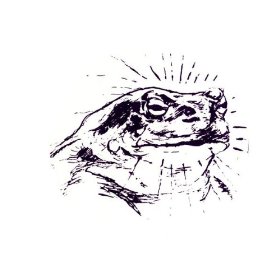Pretty much from the starting blocks, Bardo Pond have been about getting high as motherfuckers, and not being ashamed of it. However, this does not mean that they threw this info in everyone’s face: you’d need at least a caner’s working knowledge to get the references in some of their album titles, as much as you’d have to psych yourself up for the edge-scuffed fuzzblast intensity of their fuckings with rock music. As Set and Setting, their smoke monster of a fourth album, borrows terminology used in ‘how to make your acid trip work for you’ type advice, and Amanita, their sophomore effort from 1996, is a family of mushrooms which will either leave you mashed or poisoned, so Bufo Alvarius is a species of toad which produces venom that can be harvested and smoked for the purpose of seeing hell of visions. (Did you know that the idea you can get high by licking toads is an urban myth? I bet Bardo Pond did.)
This was the Philadelphia quintet’s debut album, recorded for the Drunken Fish label in 1994 – dependable UK indie Fire have done a sterling rerelease job here – and, you know, that was a year in which Pato Banton got to perform his number one single on Top Of The Pops uncensored because no-one twigged what a “bag of sensi” was, so a bunch of willfully whacked longhairs in what sounded like perpetual search of a Hawkwind lockgroove were probably okay to have their own private joke. And yet: people glommed on to Bardo Pond, Matador releasing Amanita just over a year after Bufo Alvarius came out. It’s not hard to see why: clearly, they were never going to make mass consumption music, but they sounded like pretty much nothing else out there. In the main, they still don’t.
There aren’t really any riffs on ‘Adhesive’, just reverb reverb REVERB, and that’s what they choose to open the album with. ‘Back Porch’ has a certain linearity to it, in that there’s an unmistakable Blue Cheer stoner-blues chord beating at its centre, as well as Isobel Sollenberger’s abstract wail. (Not sure when exactly people started comparing her to Grace Slick, but it’s definitely stuck to an extent. Let’s be real, when you’re given the chance in a Bardo Pond review to invoke someone who tried to put LSD in Nixon’s cuppa, you’re gonna do it, because you like corny old drug references, because you’re lame.) ‘No Time To Waste’ starts off like a ZZ Top tuneup and ends up being the blueprint for the cream of Comets On Fire’s two Sub Pop LPs, which is some royal dairy produce indeed. The guitars of the Gibbons brothers – John and Michael – and Clint Takeda’s bass jump out at you individually, for a few seconds, then rush back together and become as inseparable as lava.
On initial release this album was titled Bufo Alvarius, Amen 29:15 – ‘Amen’ being a track of that length that was only on the CD version because almost half an hour of mud-shuddering low end love pressed on to one side of vinyl is basically not possible. Anyone who went for analogue because they didn’t like CDs was a total mug, because this song (‘song’) is a supreme victory for formless indulgence. Elephantine in size, overwhelming presence and its inability to be anything but thick and lumbering – those are compliments – bubbling Echoplex is played off against fried chunks of very electric guitar and bursts of noise transcendence, and assuming you can latch onto it in the first place it’s hard not to become immersed in the whole. After which it only leaves ‘Fixed’, an exclusive bonus track with frantic drumming and Sollenberger sounding vaguely Kim Gordon-ish, to wave us away.
You would be totally within your rights to stand up and say that Bardo Pond weren’t as loud or droney or ethereal or toxin-damaged or sludgy or imposing or revelatory as My Bloody Valentine or Sonic Boom or Sun Dial or Earth or Fushitsusha or Skullflower or hearing a tannoy at a station in the voice of Jesus. You’d be sailing over the point, though. Bufo Alvarius never gives the impression that Bardo Pond were concerned with achieving extremes in anything, just in stepping in the jam room with some quarter-formed, rarely-hybridised ideas and seeing where they might lead.
I was in my late teens when Bardo Pond first began to seduce me, and in the process of sailing rudderlessly through music with, often, little or no understanding of context and legacy. I also really loved Mogwai and Kyuss at the time, and the idea of a band that combined elements of both – really long songs with minimal vocals and pedal boards covering about a hectare; fuzzhead riffs from the genus Sabbathi made by acid-drenched dropouts – was pretty damn perfect. Obviously, and with the benefit of hindsight, that doesn’t tell you much about where Bardo Pond came from, or where they went on future excursions (they have released six other ‘official’ albums plus a shit ton of limited run CDRs). It should, however, tell you that this should be a part of anyone’s life, should their interests include the last three decades of psychedelic rock.


